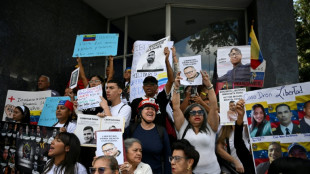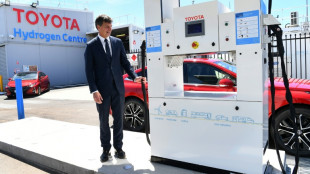

US aircraft carrier in Latin America fuels Venezuelan fears of attack
A US aircraft carrier strike group arrived in Latin America on Tuesday, escalating a military buildup that Venezuela has warned could trigger a full-blown conflict as it announced its own deployment.
The USS Gerald R. Ford, the world's largest aircraft carrier, entered the US Naval Forces Southern Command's area of responsibility, which encompasses Latin America and the Caribbean, the command said in a statement.
The vessel's deployment was ordered nearly three weeks ago to help counter drug trafficking in the region.
Its presence "will bolster US capacity to detect, monitor, and disrupt illicit actors and activities that compromise the safety and prosperity of the United States homeland and our security in the Western Hemisphere," Pentagon spokesman Sean Parnell said.
President Donald Trump's administration is conducting a military campaign in the Caribbean and eastern Pacific, deploying naval and air forces for an anti-drugs offensive.
Caracas fears the deployment, which also includes F-35 stealth warplanes deployed to Puerto Rico and six US Navy ships in the Caribbean, is a regime change plot in disguise.
President Nicolas Maduro, whose last two reelections were dismissed as fraudulent by Washington and dozens of other countries, has accused the Trump administration of "fabricating a war."
On November 2, Trump played down the prospect of going to war with Venezuela but said Maduro's days were numbered.
US forces have carried out strikes on at least 20 vessels in international waters in the region since early September, killing at least 76 people, according to US figures.
The Trump administration has said in a notice to Congress that the United States is engaged in "armed conflict" with Latin American drug cartels, describing them as terrorist groups.
Washington has not provided any evidence the vessels were used to smuggle drugs, and human rights experts say the strikes amount to extrajudicial killings even if they target traffickers.
- 'Unacceptable' -
Venezuela announced Tuesday what it called a major, nationwide military deployment to counter the US naval presence off its coast.
The defense ministry in Caracas spoke in a statement of a "massive deployment" of land, sea, air, river and missile forces as well as civilian militia to counter "imperial threats."
VTV, the state TV channel, broadcast footage of military leaders giving speeches in several states.
Such announcements are common in Venezuela these days, but have not always led to visible military deployments.
Experts have told AFP that Venezuela would be at a serious disadvantage in a military standoff with the United States, with an ill-disciplined fighting force and outdated arsenal.
On Tuesday, Russia denounced US strikes on boats from Venezuela -- an ally of Moscow -- as illegal and "unacceptable".
"This is how, in general, lawless countries act, as well as those who consider themselves above the law," Foreign Minister Sergei Lavrov said in televised remarks, questioning what he described as a "pretext of fighting drugs".
Maduro relies heavily on the Kremlin for political and economic support.
US-Russia relations have soured in recent weeks as Trump has voiced frustration with Moscow over the lack of a resolution to the Ukraine war.
The United Kingdom, meanwhile, would not comment Tuesday on a CNN report that it had stopped sharing intelligence with the United States about suspected drug-smuggling vessels in the Caribbean as it did not want to be complicit in any strikes.
A spokesman for Prime Minister Keir Starmer told reporters in London: "We don't comment on security or intelligence matters."
He underlined that "the US is our closest partner on defense, security, intelligence," and would not be drawn on UK concerns about the US strikes.
"Decisions on this are a matter for the US," the spokesman said.
burs-mlr/iv
Y.Byrne--NG



